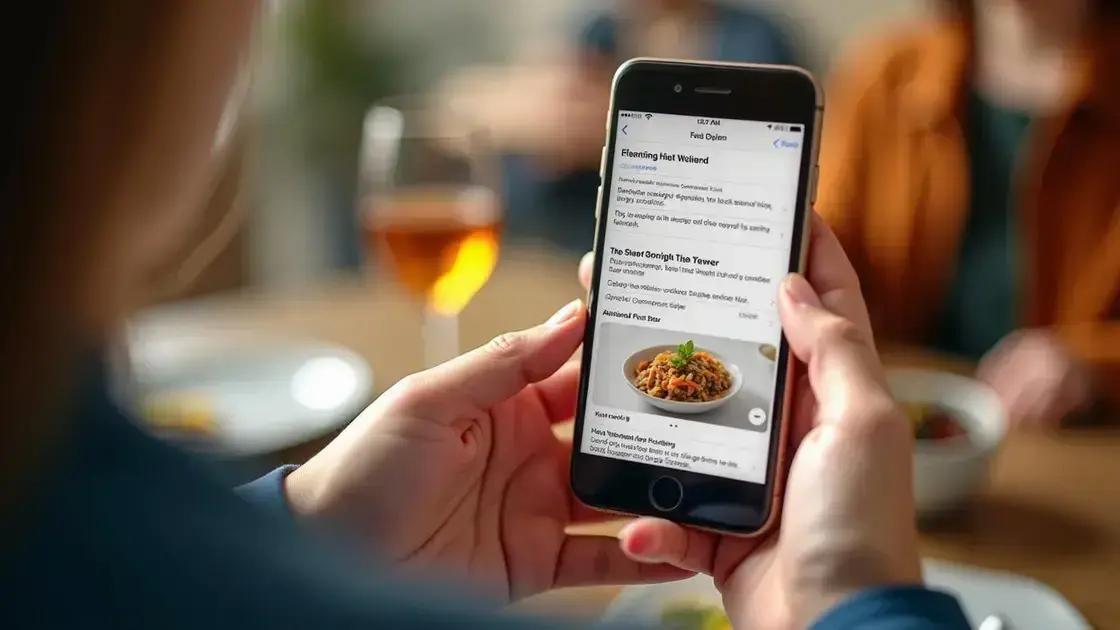To prevent overeating during social gatherings, recognize your triggers, practice mindful eating, and implement practical strategies like using smaller plates and planning ahead. Enjoy your favorite foods in moderation while staying aware of your hunger and fullness cues.
Social gatherings can often lead to unintended overeating, making it challenging to stay on track with health goals. Learning how to prevent overeating during social gatherings is crucial for enjoying these events while maintaining balance. In this article, we will explore effective strategies, mindful eating practices, and essential tips that empower you to make healthier choices when surrounded by tempting foods.
Recognizing Triggers for Overeating

Recognizing triggers for overeating is a vital step in maintaining control during social gatherings. Emotional triggers often play a significant role. Many people eat when they’re anxious, bored, or even happy. It’s essential to identify these feelings and understand when they lead to eating.
Common Emotional Triggers
Some common emotional triggers for overeating include:
- Stress: Many turn to food as a comfort during stressful moments.
- Social Pressure: The need to fit in can lead to overeating, especially when everyone is indulging.
- Boredom: Sometimes, eating is a response to feeling bored or unengaged with the environment.
- Celebration: Events that celebrate achievements often include food, making it easy to overindulge.
Being aware of these triggers is the first step in countering them. Physical triggers can also lead to overeating, including sights, smells, and the availability of food.
Identifying Physical Triggers
Pay attention to these physical cues during social gatherings:
- Visual Stimuli: Seeing a spread of colorful dishes or an appealing cake can prompt unwanted cravings.
- Smell: Odors of delicious food can stir hunger even when you aren’t actually hungry.
- Availability: If tempting snacks are within reach, it’s easier to overeat without thinking.
To better manage these triggers, practice self-awareness. Keep a food diary or reflect on your feelings before reaching for food. This practice can help reinforce your understanding of personal eating patterns.
Practical Strategies to Moderation

Implementing practical strategies can help manage portion sizes and make moderation easier during social gatherings. Start with smaller plates. Using smaller dishes can trick your mind into feeling satisfied with less food. This simple change can significantly reduce how much you eat without feeling deprived.
Control Your Portions
When at a buffet or food table, consider these tips:
- One plate rule: Serve yourself one plate of food and avoid going back for seconds.
- Share dishes: If possible, share a dish with someone else. This can help keep portions in check.
- Take small bites: Chewing food thoroughly allows time for your body to register fullness.
Engage in conversations instead of focusing solely on food. This can help distract you from mindless eating. When you are talking and enjoying the event, you may not think about food as much.
Plan Your Indulgences
Think ahead about what food you really want to try. Allow yourself to indulge in one or two of your favorite dishes rather than eating everything in sight. Consider these factors:
- Selective eating: Choose your favorite dishes wisely. Enjoy them without guilt, but limit your selection.
- Healthy swaps: Opt for healthier alternatives when possible, like veggies instead of chips or fruit instead of dessert.
Stay hydrated. Drinking water throughout the event can help you feel full. It may also prevent you from confusing thirst with hunger. Be mindful about your beverage choices as well. Alcohol and sugary drinks can add extra calories quickly.
Mindful Eating Practices

Mindful eating practices can help you enjoy your food and stay in control during social gatherings. Start by paying attention to your food. Focus on the flavors, textures, and aromas of each bite. This awareness can help you appreciate your meal and reduce the urge to overeat.
Engage Your Senses
Engaging all your senses can enhance your experience:
- Look: Notice the colors and presentation of your food. Bright and attractive plates can increase enjoyment.
- Smell: Before you take a bite, inhale the aromas. This anticipation can make eating more satisfying.
- Taste: Take small bites and chew slowly. Savoring each bite can lead to better satisfaction and reduce the desire for seconds.
Set a pace when eating. Slow down and take breaks during your meal. Put your utensils down between bites to give your body time to signal when it is full.
Listen to Your Body
Mindful eating also involves listening to your body’s signals:
- Hunger levels: Check in with yourself before eating. Are you truly hungry, or is it just habit or social cues?
- Fullness cues: Pay attention to when you start feeling full. This will help you stop eating when satisfied.
Limit distractions during meals. Try to avoid phones and screens while eating. This focus allows for greater awareness of what and how much you are consuming.
Planning Ahead for Social Events

Planning ahead for social events can significantly reduce the chances of overeating. Before you attend, take time to think about your food choices. Consider eating a healthy snack before you arrive. Having a small meal or snack can help you feel less hungry and prevent you from bingeing on appetizers.
Make a Plan
Think about what foods you might encounter:
- Identify your favorites: List the dishes you really want to enjoy. This makes it easier to focus on what you truly love.
- Set limits: Decide how much you will eat in advance. For example, allow yourself to try three small portions of different foods.
Communicate your goals with friends or family. Let them know you’re trying to eat mindfully. They can help support your efforts by avoiding peer pressure around food.
Research the Menu
If you know the menu in advance, you can plan accordingly. This practice helps in:
- Choosing wisely: Look for healthier options, like salads or grilled meats, and skip heavy sauces or fried foods.
- Staying aware: Knowing what will be served helps you understand how to balance your plate.
Also, consider bringing a healthy dish to share. This way, you’ll ensure there’s something nutritious available that you want to eat.
Mind Your Drink Choices
Drinks can also add many empty calories. Plan your beverages ahead of time:
- Limit sugary drinks: Choose water or sparkling water instead of soda or sweetened beverages.
- Be mindful with alcohol: If you drink, set a limit for yourself. Plan to alternate alcoholic drinks with water.
By planning ahead, you’ll feel more prepared and confident. This approach can help you enjoy social events without overindulging.
Embrace Healthy Eating at Social Gatherings
Understanding how to prevent overeating during social gatherings can empower you to make better choices. By recognizing triggers, implementing practical strategies, and practicing mindful eating, you can enjoy these events without guilt.
Planning ahead also plays a crucial role in maintaining balance. Whether it’s selecting healthy snacks beforehand or mapping out your meal choices, preparation truly makes a difference.
With these essential tips, you can confidently navigate social situations while prioritizing your health. Embrace the joy of socializing and savor the flavors of your favorite dishes—all while staying in control.
FAQ – Frequently Asked Questions on Preventing Overeating During Social Gatherings
What are some effective strategies to prevent overeating?
Effective strategies include using smaller plates, practicing mindful eating, and recognizing emotional and physical triggers.
How can I practice mindful eating?
You can practice mindful eating by focusing on your food, engaging your senses, and taking small bites while savoring each one.
What should I do if I know I’ll be at a buffet or social event?
Plan ahead by eating a healthy snack before the event, knowing your choices, and setting limits on what you’ll eat.
Why is it important to plan ahead for social events?
Planning ahead helps you make healthier choices and reduces the likelihood of overeating by keeping your goals in mind.
How can I communicate my eating goals to friends or family?
Simply share your intentions with them before the event. They often will help support your choices and avoid pressuring you.
Is it okay to indulge a little during social gatherings?
Yes, allowing yourself to enjoy your favorite foods in moderation can help you maintain a balanced approach to eating.













